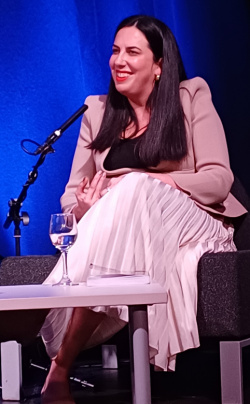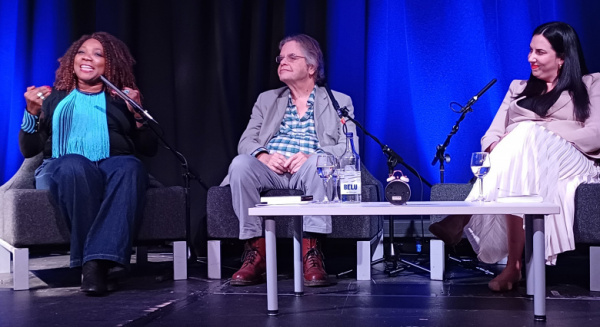It’s not ‘woke’ to say this is a horror story – rich, lyrical, appalling

‘The Hottentot Venus’ was Sarah Baartman, a Khoikhoi woman from South Africa who was displayed at freak shows around 19th century Europe. It’s not ‘woke’ to draw attention to this; it’s an amazing and shameful story, told in appalling and horrifying detail by Dzifa Benson in her debut collection Monster.
Benson was born in London to Ghanaian parents, and grew up in Ghana, Nigeria and Togo. At Newcastle Centre for the Literary Arts on Thursday evening she read ‘The Hottentot Venus Hails Botticelli’s on the High Seas’, revealing afterwards that it was narrated by Baartman’s ghost. It was recently published in the Guardian and analysed by Carol Rumens:
Your face is our stopped
time as if you’re the only
woman in this coarse world
as if we are not all crafted
from the same mud as you
as it it’s possible that we can
all the look the same at night
Half of Benson’s collection is dedicated to Sarah Baartman, and although the poems are laced with anger, they are also lyrical, celebratory and truly shocking. There are also sonnets for other ‘freaks’ displayed at places such as Bartholomew Fair; and the odd poem reflecting the efforts of anti-slavery campaigners to help Sarah, including a court case brought by the Attorney-General.
Other facets of the collection, which contains a variety of forms and techniques, include a series of ekphrastic poems such as ‘In the Company of Trees’, after David Hockney’s Bigger Trees Near Warter, “whittled to pixels by the artist on an iPhone”. Benson goes on: “Always bigger things to do - / a bigger tree, the biggest splash, why not a canyon? He’ll need bigger / brushes, that’s for sure.”
In her lengthy acknowledgements at the end of Monster, Benson, who works in “multiple media”, thanks her publisher Neil Astley, editor of Bloodaxe Books: “I can’t tell you how much the alacrity with which you accepted this book steadied and encouraged me.” Astley’s eagerness doesn’t surprise me. I am sure that this rich, multi-layered collection is a candidate for a major poetry award.

At the heart of the collection is a powerful and often heart-rending series of poems about her father, who suffered with Parkinson’s disease for 20 years before his death. The title poem refers to what Holland-Batt described as a “lesser-known but apparently quite common symptom [of Parkinson’s] … compulsive spending or gambling”. In her father’s case this was manifested in his purchase of a vintage Jaguar via the internet, without inspecting it, the day after he had received medical advice that he should no longer drive:
It gleamed on the terracotta drive,
wildcat forever lunging on the hood,
predatory, the chrome snagging in the sun,
ornament of my father’s madness
He started to tinker with it, painting the leather seats with acrylic so that they peeled and cracked, hacking a hole into the dashboard with a Stanley knife:
For months
he drove it even though my mother begged,
he drove it as though he was punishing her,
dangerously fast on the back roads, then
opened up the engine on the highway, full
throttle, even though he was going blind in one eye
Eventually his modifications finish off the car:
the car he always wanted and waited
so long to buy, and it sat like a carcass
in the garage, like a headstone, like a coffin –
but it’s no symbol or metaphor. I can’t make anything of it.
I have quoted at length from this poem because it reads like an epic, encapsulating a tragedy. Other poems about her father included another facet of Parkinson’s, the ability to weep easily, and in her parent’s case whenever he thought about Winston Churchill – and he thought about Churchill a lot (‘Empires of mind’).
She admitted that writing so many poems about his illness required a certain toughness, a toughness she also recognised in writing poems about ending relationships, such as ‘The Proposal’, when a rejected lover unsuccessfully flies to New York to try and change her mind, and ‘Parable of the Clubhouse’, which she described as “a love poem that thinks through a metaphor right to the end”.
Holland-Batt finished with ‘The Orchid House’, which contains echoes of Australia’s involvement in Vietnam. In a question and answer session chaired by Neil Astley, Dzifa Benson claimed common cause on orchids: “My mother is an expert … they are eerie. She has 650 of them in her garden. My next book is going to be called The Orchid Lady.”
Although both poets delivered excellent readings in Newcastle, they agreed that, in Benson’s words, “poetry really has no production values … poets often mumble their poems apologetically”. Holland-Batt added: “A lot of poets are not natural extroverts. The more poetry readings you sit through, the more you wish for a slower pace.”
Benson came up with one solution at least, saying she was thinking of doing a “theatre piece using poetry”, which might make use of her African Ewe heritage [an ethnic group based in Ghana and Togo] and a technique known as “dance-drumming”, which is believed to start in the spine. Something to look forward to!

Dzifa Benson and Sarah Holland-Batt with Bloodaxe editor Neil Astley at the NCLA




